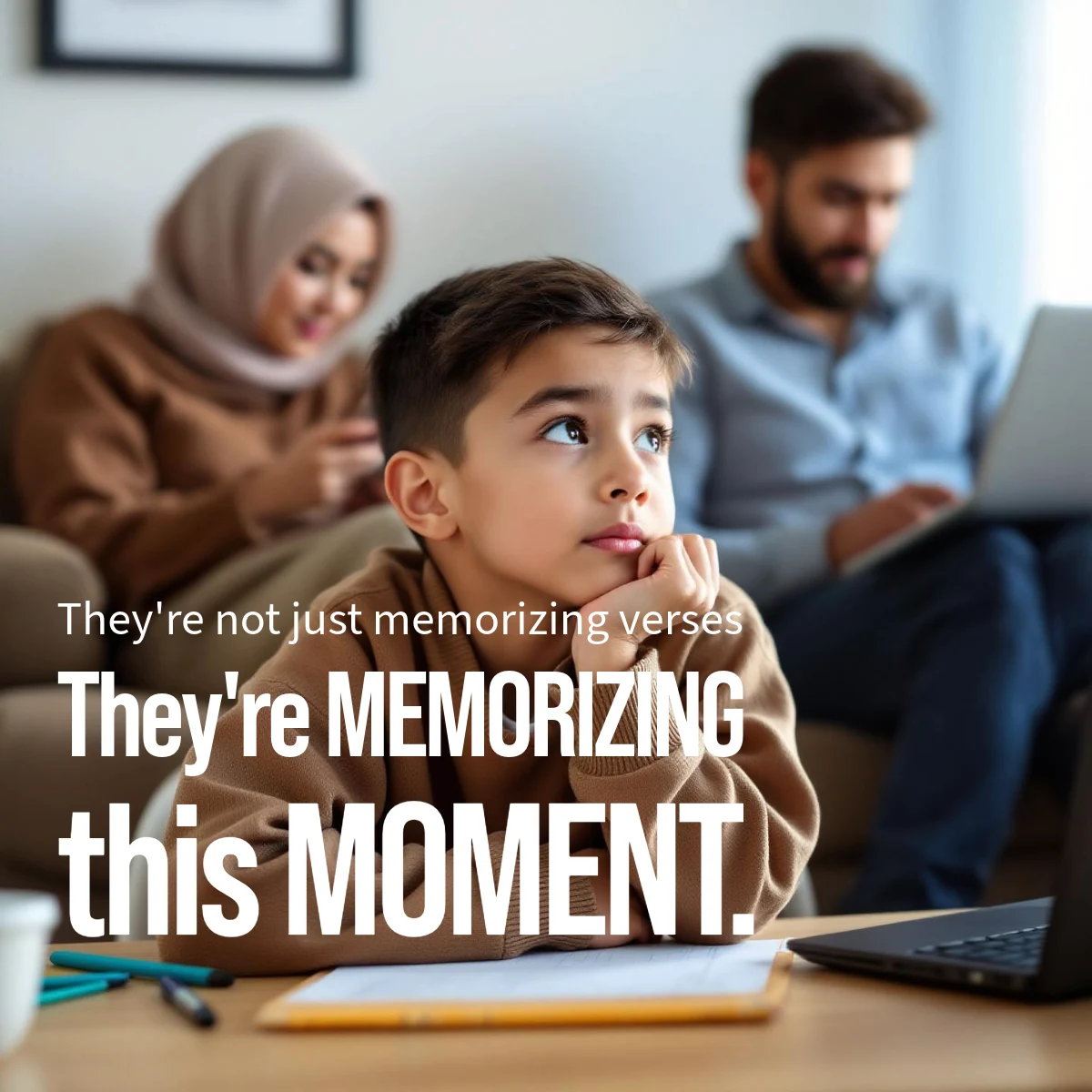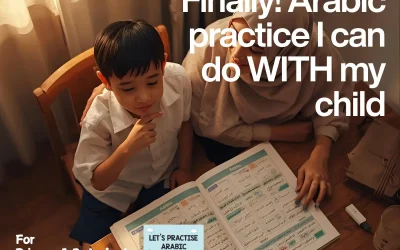When was the last time you sat with the Quran?
Not to quiz your child. Not to check their progress.
Just you. The book. These words.
Our children are watching. And what they’re learning might break your heart.💔
I’ll wait . . .
Because here’s what’s happening in our homes right now:
We have time to scroll through our phones for twenty minutes before bed.
We have time to watch that series everyone’s talking about.
We have time for coffee with friends, for window shopping, for another hour on social media.
But when it comes to sitting with the Quran?
“I’m too busy.”
“I don’t have time.”
“I’m not good at Arabic.”
And our children are watching.
Oh, they’re watching everything 😊.
We tell them the Quran is important. We enroll them in classes. We remind them to practice. We quiz them on their verses.
We’re doing everything right.
Except one thing.
We’re not sitting with it ourselves.
So what do they learn?
The Quran is for children.
It’s like vegetables. Good for you, but not something adults actually enjoy.
It’s something you do until you grow up. Until you get busy with real life.
They don’t learn this from what we say.
They learn it from what we do.
From what they don’t see.
Picture this:
A child memorizing every night. Parents checking their progress. Everyone proud of how many verses they’ve learned.
But then one day, that child asks: “When will I be old enough to stop?”
Think about that question for a moment.
When will I be old enough to stop?
Where did they get that idea?
That the Quran has an expiration date?
That it’s something you graduate from?
They got it from watching us.
From seeing that we don’t sit with it anymore.
From learning that once you’re an adult, once life gets busy, once you have real responsibilities…
These words become optional.
Here’s what breaks my heart:
These are the most beautiful words in existence. ✨
The words Allah chose. The guidance He sent. The light He promised.
And without meaning to, we’ve turned them into homework.
Into something to get through.
Into another item on the to-do list.
And then we wonder why some children grow distant from it.
But here’s what I realized, and it changed everything 💡:
What if we’ve been asking the wrong question?
We keep asking: “How do I get my child to memorize the Quran?”
But maybe the real question is: “What am I teaching my child about what the Quran means to me?”
Because they’re not just memorizing verses.
They’re memorizing this moment.
The feeling in the room when Quran time comes.
Is it stress? Or is it peace?
Is it pressure? Or is it love?
Are they doing this alone? Or are we in it together?
I was reading Surah Al-Qamar recently, and this verse stopped me:
“And We have certainly made the Quran easy for remembrance, so is there any who will remember?”
Easy for remembrance.
Not easy for children. Not easy for scholars.
Easy for remembrance. For all of us.
The invitation is still open.
Even for us adults, with our busy lives and our endless excuses.
The invitation is still here.
So what if we did something radical?
What if we became students again?
What if, instead of supervising their memorization, we sat beside them and memorized with them?
I’m not talking about perfection.
I’m talking about proximity.
Sitting next to your child with your own mushaf.
Stumbling over the same verses they’re stumbling over.
Letting them correct your pronunciation.
Showing them that these words still matter to you – at your age, with your responsibilities, with your full, messy, complicated life.
Think about what that teaches them.
Not with words. With presence.
It teaches them: This doesn’t end. This doesn’t expire. This isn’t something you graduate from.
This is life. This is for always.
And here’s the beautiful part:
You don’t have to be an expert.
You don’t have to know Arabic fluently.
You don’t have to memorize at their pace.
You just have to show up.
Because when they see you trying – really trying – something shifts.
Suddenly it’s not their thing they have to do.
It’s our thing we get to do together.
Imagine years from now.
Your child is grown. Living their own life.
And someone asks them about their childhood memories.
What will they say about the Quran?
Will they remember it as something they had to do alone?
As pressure? As stress? As something they couldn’t wait to be done with?
Or will they remember sitting beside you?
Both of you stumbling. Both of you trying. Both of you learning.
Will they remember that it wasn’t just for them – it was for both of you?
That’s the memory that stays.
That’s what shapes everything.
See, we think we’re teaching them verses.
But we’re actually teaching them a relationship.
We think we’re giving them memorization.
But we’re giving them an inheritance.
And the inheritance isn’t just the words.
It’s how they feel about the words.
If they memorize under pressure, they inherit pressure.
If they memorize in isolation, they inherit the idea that this is something you do alone.
But if they memorize with you – with your imperfect recitation, your slow progress, your genuine try – they inherit something else entirely.
They inherit the understanding that the Quran is not separate from life.
It is life.
At seven. At seventeen. At seventy.
The verses they memorize might fade sometimes.
Life gets busy. We forget. It happens.
But the feeling?
The memory of sitting together?
The understanding that these words mattered to both of you?
That stays.
That shapes everything.
One day – sooner than you think – your child will be grown.
They’ll have their own life, their own struggles, their own choices to make.
And somewhere in a difficult moment, they might reach for the Quran.
Or they might not.
What will determine that choice?
Not how much they memorized.
But how it felt when they did.
Did it feel like love… or like pressure?
Did it feel like something that brought them closer to you… or pushed them away?
Did it feel like a burden to carry… or a light to hold onto?
You’re deciding that right now.
Not with your words.
With your presence.
Or your absence.
So maybe tonight, instead of just checking their progress…
Sit beside them.
Open your own mushaf.
Start with one verse. Just one.
Stumble through it together.
Let them hear you try.
Let them see that these words still have power over you too.
That you still need them.
That you’re still learning.
You don’t have to be perfect.
You just have to be there.
Because here’s what I’ve learned:
The greatest gift you can give your child isn’t perfect Quran recitation.
It’s showing them that the Quran is worth your time.
Your attention.
Your effort.
Even now. Even with everything else you’re carrying.
These words are still here.
The invitation is still open.
For them.
And for you.
What will they remember?
You get to decide.
Starting today. 🌟




